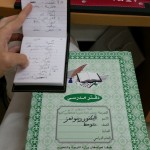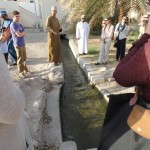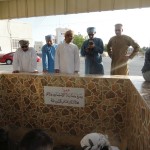Wow, it’s been a busy past couple of days. I didn’t write a blog post yesterday because I was so tired.
Having classes only in Arabic is very difficult. I only understand about half of what our professors say, but I think it’s getting better. Our first teacher, Fatima, is much easier to understand than Uthman, our second teacher, but I like both of them a lot. They are very kind, and they don’t get frustrated when I don’t understand them.
Yesterday when I got out of class, I was very upset because I really had no idea what was going on, and I didn’t even understand our homework. This is the first time in my life that I’ve felt lost in any class. But today I understood more; if I improve the same degree every day then I will have no problem keeping up. I talked with Uthman about switching to the beginner level, and he said that if I work and study hard I will be fine. Of course I don’t really want to work that hard during the summer, but all of you who know me well know that I’m not usually someone who chooses the easier option.
In our classes the past two days we’ve read articles and talked about cooperation between different cultures, coexistence in the world, and forms of communication throughout history. Everyone here has been so nice; I haven’t even seen any Omani say or do a single thing that wasn’t generous.
- A fresh date in case anyone was wondering what those look like. It tasted good but also like the desert.
- My little notepad of vocabulary and my notebook for class.
- The schedule of meals in our cafeteria.
- Another plate of the free food provided by our school! The hummus was almost as good as that from the Pita House
Last night we had a very interesting lecture courtesy of Dr. Suleiman Al-Husayn about the history of Oman from when the first people settled there until the 19th century. I’m going to summarize that lecture in the next paragraph so if you’re not interested feel free to skip it.
Humans began to live in Oman about 1.6 million years ago, but these are not the same people who populate most of Oman today. Most Omanis are descended from tribes led by Malik bin Faham, who immigrated to Oman from Yemen; this is when Oman became an Arabic country. A second major event in Omani history was when Oman accepted Islam under the two kings Abd and Jafair – they converted peacefully after talking with Muhammad’s ambassador ‘Amr bin al-‘As. Oman had an agreement with Muhammad to maintain its own government. By the 8th century, Oman was an important center for trade. Omanis are known as skillful sailors and negotiators – not fighters. During the 18th century, Oman had an empire stretching from the Arabian peninsula down the East coast of Africa to Madagascar – the capitol of this empire was on the island of Zanzibar. Oman lost its territory after the Western powers began to colonize Africa. This is just a short summary of the main historical points of the lecture; there was a lot more information.
My favorite thing that Dr. Al-Husayn talked about was the “meaningful emptiness” of the desert. He said that the desert is a place where one is completely alone with his own mind, and I really liked his phrasing. This lecture was actually in English.
Afterward I talked with Al-Husayn. He said that he is so happy that there are Americans who want to learn about Omani culture and that it is important that we understand and tolerate different peoples. Then he mentioned to us that Islam came to Oman peacefully and that people must not learn about Islam by force. He hopes that we can be ambassadors for Oman in America. This is actually possible in a way because there are a ton of Omani students at USC. USC has a partnership with the Omani government, and there is an Omani Student Association at USC that I hoped to be involved with.
I leave you today with two pictures that I forgot to upload the other day:
- Another view of our guides over the falaj.
- Our guides – wearing traditional Omani clothing.





